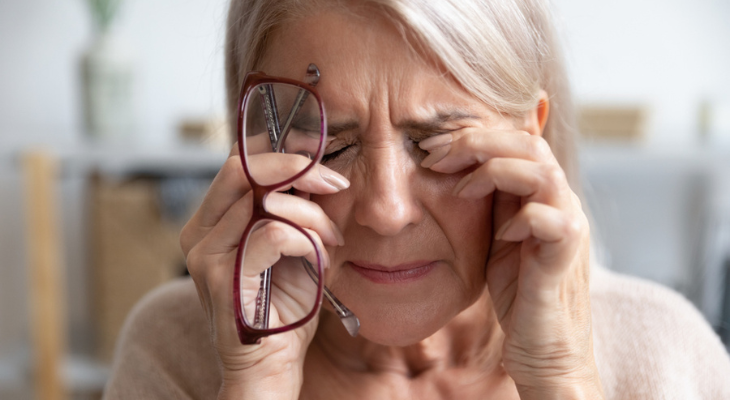
Could Hearing Loss and Vision Loss Be Related?
Wondering why you're having trouble seeing and hearing? Unfortunately, these sensory problems can happen at the same time in some cases. Hearing and vision loss can be caused by several conditions and diseases, including:
Aging
Tiny hairs in your inner ear pick up sound waves and convert them to nerve signals. The brain receives the signals and changes them to sounds. As you grow older, hair cells die or become damaged, causing hearing loss.
At the same time, you may notice that your vision is worsening. Cataracts are a common age-related reason for poor vision and can be caused by years of sun exposure. Cataracts cloud the lens inside your eye and cause blurry, hazy vision, glare, and faded colors. Cataract surgery improves vision by replacing your cloudy lens with a clear, artificial lens.
Other conditions and diseases that can cause vision loss include glaucoma, diabetic retinopathy, and age-related macular degeneration, a condition that affects central vision.
Illnesses and Diseases
Measles and chickenpox aren't just harmless childhood diseases. In fact, these diseases can cause complications that affect hearing and vision. Vaccinating your children will help them avoid measles and chickenpox and the lifelong health problems these diseases may cause.
Diabetic retinopathy, a common cause of vision loss in people who have diabetes, happens if your blood sugar levels are too high for too long. When diabetes is poorly controlled for a long time, blood vessels in the retina leak, interfering with vision. The retina captures light rays as they enter the eye and sends them to the brain for processing.
The brain receives incomplete information from the eyes when blood vessels leak, which causes blurry vision or dark spots. Special injections or laser treatment can stop leaks and shrink swollen blood vessels in the retina.
Diabetes-related hearing loss could be caused by damage to the nerves and blood vessels in the ear. If you already have hearing loss, carefully controlling your blood sugar will prevent further damage, while hearing aids and other assistive devices will make your life easier.
Other diseases and conditions that may cause both hearing and vision loss include cancer, Lyme disease, brain tumors, and meningitis.
Rare Conditions
Usher Syndrome, a rare genetic condition, affects both hearing and vision. Vision loss occurs due to retinitis pigmentosa (RP), an eye disease that causes night blindness and peripheral (side) vision loss. Vision changes often start during adolescence and slowly worsen.
Hearing loss related to Usher syndrome is caused by abnormal hair cell development, according to the National Institute of Deafness and Other Communication Disorders. Loss of hearing may occur at birth or during childhood. Depending on the severity of the syndrome, learning sign language and using hearing aids, cochlear implants, and assistive devices can be helpful.
Low vision aids and assistive devices can help you make the most of your vision if you have Usher syndrome. Vitamin A supplements could slow the progression of RP, according to the National Eye Institute. However, the supplements should only be taken with the approval of your doctor, as too much vitamin A can cause health problems.
Other rare conditions that may affect vision and hearing include deafness myopia syndrome and Susac syndrome. Deafness and myopia syndrome is a rare genetic disorder that causes severe nearsightedness and moderate to profound hearing loss. Susac syndrome is an autoimmune condition that damages small blood vessels in the ears, eyes, and brain
Down Syndrome
Hearing and vision loss may also affect children and adults with Down syndrome. As many as 75% of children with the syndrome have hearing loss and more than 50% have problems with vision, according to Eunice Kennedy Shriver National Institute of Child Health and Human Development. Cataracts, myopia (nearsightedness), strabismus (crossed eyes), or involuntary eye movements can impair vision. Cataract surgery, eyeglasses, and hearing aids help people with Down syndrome improve their hearing and vision.
Other Causes
A major head injury could damage your eyes and ears, leading to temporary or permanent vision and hearing loss. Temporary or permanent hearing loss might also occur after taking certain medications, like chemotherapy drugs and some antibiotic and cholesterol medications.
Have you noticed a change in your vision? Contact our office to schedule an appointment.
Sources:
National Eye Institute: Usher Syndrome, 12/14/2021
https://www.nei.nih.gov/learn-about-eye-health/eye-conditions-and-diseases/usher-syndrome
Centers for Disease Control and Prevention: Diabetes and Hearing Loss, 5/27/2022
https://www.cdc.gov/diabetes/managing/diabetes-hearing-loss.html
Eunice Kennedy Shriver National Institute of Child Health and Human Development: What Conditions or Disorders Are Commonly Associated with Down Syndrome?, 1/31/2017
https://www.nichd.nih.gov/health/topics/down/conditioninfo/associated
National Institute on Deafness and Other Communication Disorders: Usher Syndrome
https://www.nidcd.nih.gov/health/usher-syndrome
All About Vision: Will My Sight Be Affected by My Hearing Loss?, 1/21/2020
https://www.allaboutvision.com/over60/vision-and-hearing-loss/
MedlinePlus: Deafness and Myopia Syndrome
https://medlineplus.gov/genetics/condition/deafness-and-myopia-syndrome/#synonyms
CDC: Diabetes and Hearing Loss, 5/27/2022
https://www.cdc.gov/diabetes/managing/diabetes-hearing-loss.html
Cleveland Clinic: Susac Syndrome
https://my.clevelandclinic.org/health/diseases/15073-susac-syndrome
